塑料垃圾对海洋生物的影响(英文)ppt课件
- 格式:ppt
- 大小:3.95 MB
- 文档页数:17
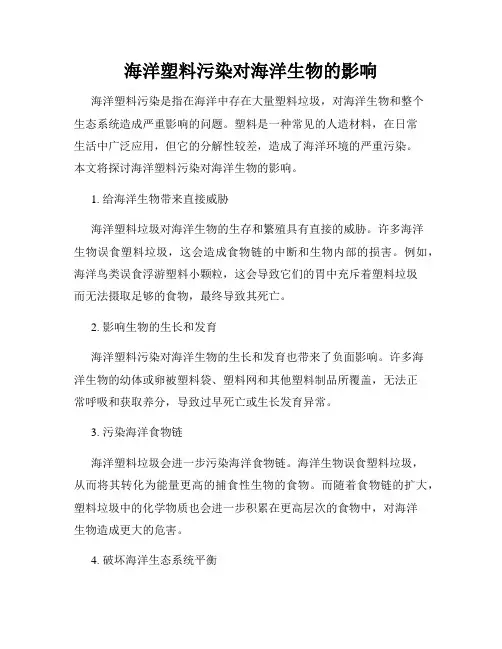
海洋塑料污染对海洋生物的影响海洋塑料污染是指在海洋中存在大量塑料垃圾,对海洋生物和整个生态系统造成严重影响的问题。
塑料是一种常见的人造材料,在日常生活中广泛应用,但它的分解性较差,造成了海洋环境的严重污染。
本文将探讨海洋塑料污染对海洋生物的影响。
1. 给海洋生物带来直接威胁海洋塑料垃圾对海洋生物的生存和繁殖具有直接的威胁。
许多海洋生物误食塑料垃圾,这会造成食物链的中断和生物内部的损害。
例如,海洋鸟类误食浮游塑料小颗粒,这会导致它们的胃中充斥着塑料垃圾而无法摄取足够的食物,最终导致其死亡。
2. 影响生物的生长和发育海洋塑料污染对海洋生物的生长和发育也带来了负面影响。
许多海洋生物的幼体或卵被塑料袋、塑料网和其他塑料制品所覆盖,无法正常呼吸和获取养分,导致过早死亡或生长发育异常。
3. 污染海洋食物链海洋塑料垃圾会进一步污染海洋食物链。
海洋生物误食塑料垃圾,从而将其转化为能量更高的捕食性生物的食物。
而随着食物链的扩大,塑料垃圾中的化学物质也会进一步积累在更高层次的食物中,对海洋生物造成更大的危害。
4. 破坏海洋生态系统平衡海洋塑料污染会破坏海洋生态系统的平衡。
塑料垃圾不仅影响海洋生物的生存和繁殖,还对珊瑚礁和海草床等生态系统造成直接破坏。
这些生态系统是许多海洋生物的栖息地和摄食场所,它们的破坏将导致整个生态系统的崩溃。
5. 威胁人类健康海洋塑料污染不仅对海洋生物造成影响,也会威胁到人类的健康。
海洋生物误食塑料垃圾后,其中的化学物质会通过食物链进入到人类的食物系统中。
这些化学物质对人体健康具有潜在危害,如内分泌干扰和致癌物质的存在。
结论海洋塑料污染对海洋生物产生了广泛而深远的影响,这不仅对海洋生态系统造成破坏,也威胁到人类的健康。
为了保护海洋生物和维护海洋生态平衡,我们需要采取积极的措施减少塑料使用、加强垃圾分类和回收,以及加强公众意识的提高,共同应对海洋塑料污染问题。
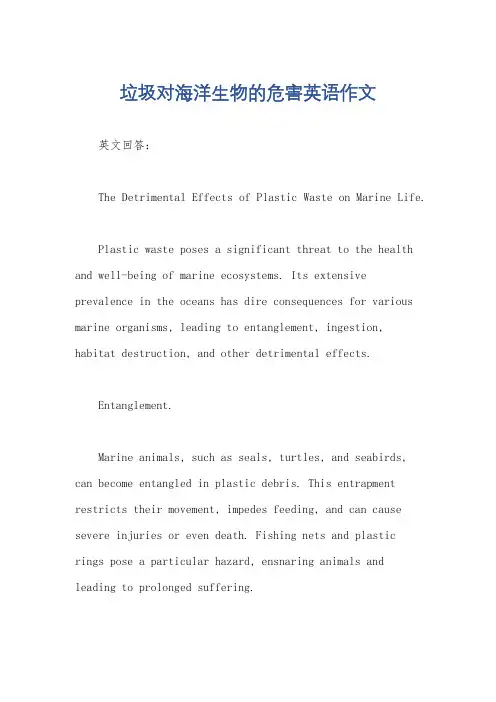
垃圾对海洋生物的危害英语作文英文回答:The Detrimental Effects of Plastic Waste on Marine Life.Plastic waste poses a significant threat to the health and well-being of marine ecosystems. Its extensive prevalence in the oceans has dire consequences for various marine organisms, leading to entanglement, ingestion,habitat destruction, and other detrimental effects.Entanglement.Marine animals, such as seals, turtles, and seabirds, can become entangled in plastic debris. This entrapment restricts their movement, impedes feeding, and can cause severe injuries or even death. Fishing nets and plasticrings pose a particular hazard, ensnaring animals and leading to prolonged suffering.Ingestion.Many marine species inadvertently ingest plastic waste, mistaking it for food. This can lead to various health problems, including gastrointestinal issues, malnutrition, and starvation. The ingestion of microplastics (smallplastic particles less than 5 mm in size) is particularly concerning due to their ability to accumulate in the food chain and potentially bioaccumulate in marine organisms.Habitat Destruction.Accumulations of plastic waste can degrade marine habitats, particularly coral reefs and seagrass beds. These habitats provide food and shelter for a wide range of species, but their integrity is compromised by the accumulation of plastic debris. Moreover, plastic waste can smother marine organisms, such as shellfish and sea urchins, reducing their ability to survive and reproduce.Other Impacts.In addition to the direct effects of entanglement, ingestion, and habitat destruction, plastic waste also indirectly impacts marine life. For instance, plastic pollution can absorb toxic chemicals from the environment and release them into the water, contaminating the marine food chain. Furthermore, plastic waste can serve asbreeding grounds for harmful microorganisms, further exacerbating the detrimental effects on marine ecosystems.Mitigation Strategies.Addressing the problem of plastic pollution requires a comprehensive approach. Key mitigation strategies include:Reducing the production and consumption of single-use plastics.Improving waste management practices.Promoting recycling and upcycling of plastic materials.Raising awareness about the impacts of plastic wasteon marine life.Supporting research and innovation to develop sustainable alternatives.By implementing these measures, we can help safeguard marine ecosystems and ensure the well-being of marine life for generations to come.中文回答:塑料垃圾对海洋生物的破坏性影响。
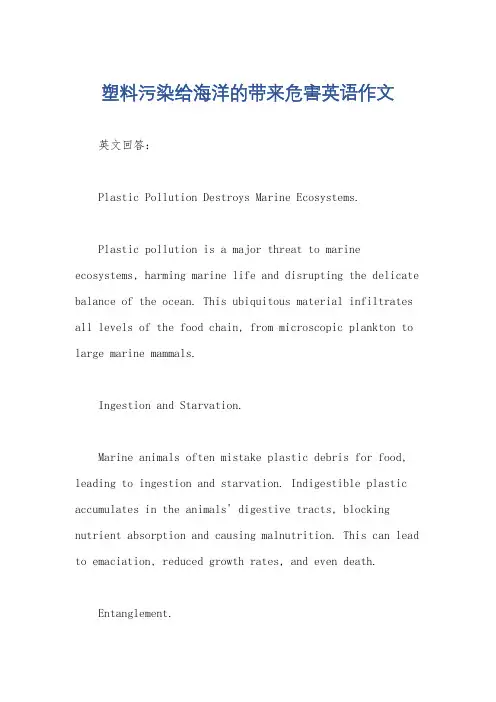
塑料污染给海洋的带来危害英语作文英文回答:Plastic Pollution Destroys Marine Ecosystems.Plastic pollution is a major threat to marine ecosystems, harming marine life and disrupting the delicate balance of the ocean. This ubiquitous material infiltrates all levels of the food chain, from microscopic plankton to large marine mammals.Ingestion and Starvation.Marine animals often mistake plastic debris for food, leading to ingestion and starvation. Indigestible plastic accumulates in the animals' digestive tracts, blocking nutrient absorption and causing malnutrition. This can lead to emaciation, reduced growth rates, and even death.Entanglement.Plastic entanglement is another significant hazard to marine life. Animals can become entangled in discarded fishing gear, plastic bags, and other debris, restricting their movement and causing injuries. Entangled animals may struggle to feed, swim, or breathe, leading to prolonged suffering or death.Chemical Leaching.Plastic materials contain a variety of chemical additives and plasticizers that can leach into the marine environment. These chemicals can have toxic effects on marine organisms, disrupting their hormonal balance, reproductive systems, and immune functions.Habitat Degradation.Plastic pollution accumulates in marine habitats, smothering coral reefs, seagrass beds, and other vital ecosystems. This degradation reduces biodiversity, disrupts food chains, and impairs the overall health of the ocean.Ghost Fishing.Abandoned or lost fishing gear made of plastic continues to capture and kill marine life in a process known as "ghost fishing." These nets and traps entangle fish, sea turtles, and other animals, leading to population declines and ecosystem disruption.Plastic Pollution Endangers Human Health.Marine plastic pollution can also pose risks to human health. Microplastics, tiny pieces of plastic less than 5mm in size, are ingested by marine organisms and can accumulate in the food chain, eventually reaching human consumers. These microplastics may contain harmful chemicals that can have adverse effects on human health.Addressing the Plastic Pollution Crisis.Addressing the plastic pollution crisis requires a multifaceted approach that involves reducing plasticproduction, improving waste management, and promoting sustainable alternatives. Governments, industries, and individuals must collaborate to implement effectivesolutions and protect marine ecosystems for future generations.中文回答:塑料污染破坏海洋生态系统。
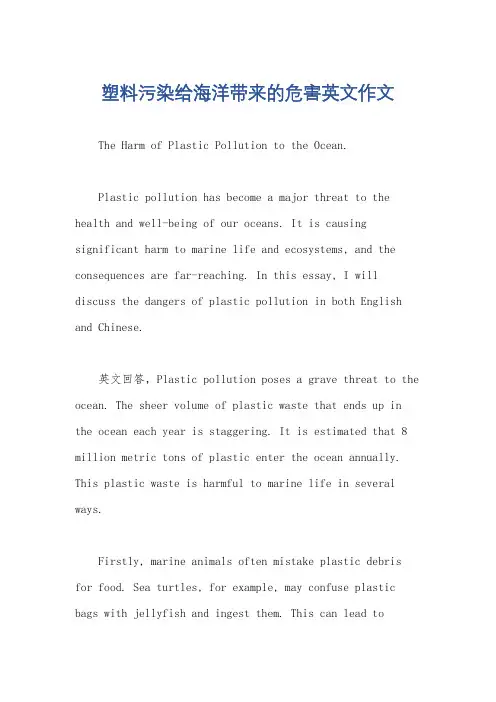
塑料污染给海洋带来的危害英文作文The Harm of Plastic Pollution to the Ocean.Plastic pollution has become a major threat to the health and well-being of our oceans. It is causing significant harm to marine life and ecosystems, and the consequences are far-reaching. In this essay, I will discuss the dangers of plastic pollution in both English and Chinese.英文回答,Plastic pollution poses a grave threat to the ocean. The sheer volume of plastic waste that ends up in the ocean each year is staggering. It is estimated that 8 million metric tons of plastic enter the ocean annually. This plastic waste is harmful to marine life in several ways.Firstly, marine animals often mistake plastic debrisfor food. Sea turtles, for example, may confuse plastic bags with jellyfish and ingest them. This can lead tointestinal blockages, malnutrition, and even death. Similarly, seabirds often consume small plastic particles, which can accumulate in their stomachs and cause starvation.Secondly, plastic pollution can also entangle marine animals, leading to injury or death. Fishing gear, such as discarded nets and lines, is a major contributor to this problem. Whales, dolphins, and seals are particularly vulnerable to entanglement, which can restrict their movement, cause injuries, and even drown them.Moreover, plastic pollution disrupts marine ecosystems. Coral reefs, for instance, are vital habitats that supporta diverse range of marine species. However, plasticpollution can smother and damage coral reefs, leading to their decline and loss of biodiversity. Additionally, microplastics, which are tiny plastic particles, can contaminate the water and be ingested by plankton, the foundation of the marine food chain. This can havecascading effects on the entire ecosystem.In conclusion, plastic pollution poses a significantthreat to the ocean and its inhabitants. It endangersmarine life through ingestion and entanglement, anddisrupts delicate ecosystems. Urgent action is needed to reduce plastic waste and prevent further harm to our oceans.中文回答,塑料污染给海洋带来了严重的危害。
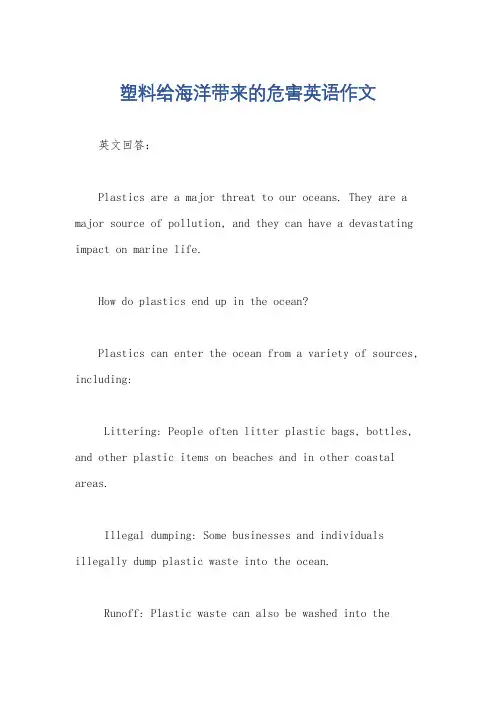
塑料给海洋带来的危害英语作文英文回答:Plastics are a major threat to our oceans. They are a major source of pollution, and they can have a devastating impact on marine life.How do plastics end up in the ocean?Plastics can enter the ocean from a variety of sources, including:Littering: People often litter plastic bags, bottles, and other plastic items on beaches and in other coastal areas.Illegal dumping: Some businesses and individuals illegally dump plastic waste into the ocean.Runoff: Plastic waste can also be washed into theocean from storm drains and rivers.What are the impacts of plastics on marine life?Plastics can have a variety of negative impacts on marine life, including:Entanglement: Marine animals can become entangled in plastic bags, bottles, and other plastic items. Entanglement can cause injury, starvation, and death.Ingestion: Marine animals can also ingest plastic particles. Plastic particles can block the digestive tract, causing starvation or death.Toxicity: Some plastic chemicals can be toxic tomarine animals. These chemicals can cause a variety ofhealth problems, including cancer and reproductive problems.What can we do to reduce the impact of plastics on oceans?There are a number of things we can do to reduce the impact of plastics on oceans, including:Reduce our use of plastics: We can reduce our use of plastics by choosing reusable items over disposable ones, and by recycling plastic products.Dispose of plastics properly: We should always dispose of plastic waste in designated trash receptacles.Support organizations that are working to reduce plastic pollution: There are a number of organizations that are working to reduce plastic pollution in oceans. We can support these organizations by donating money or volunteering our time.中文回答:塑料给海洋带来的危害。
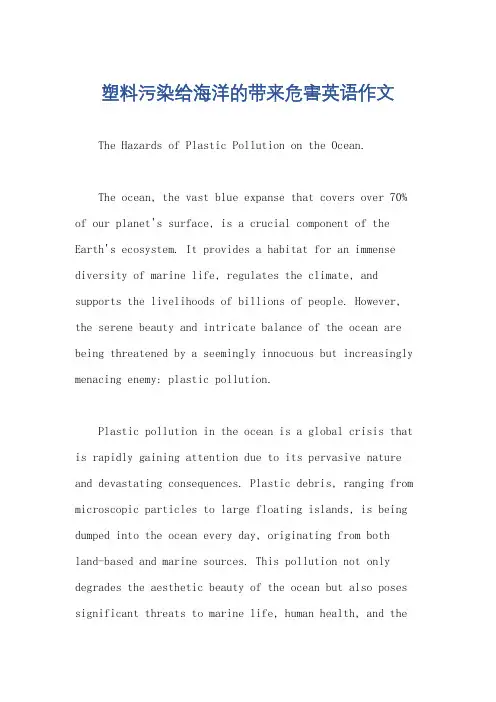
塑料污染给海洋的带来危害英语作文The Hazards of Plastic Pollution on the Ocean.The ocean, the vast blue expanse that covers over 70% of our planet's surface, is a crucial component of the Earth's ecosystem. It provides a habitat for an immense diversity of marine life, regulates the climate, and supports the livelihoods of billions of people. However, the serene beauty and intricate balance of the ocean are being threatened by a seemingly innocuous but increasingly menacing enemy: plastic pollution.Plastic pollution in the ocean is a global crisis that is rapidly gaining attention due to its pervasive nature and devastating consequences. Plastic debris, ranging from microscopic particles to large floating islands, is being dumped into the ocean every day, originating from both land-based and marine sources. This pollution not only degrades the aesthetic beauty of the ocean but also poses significant threats to marine life, human health, and theoverall functioning of the ocean ecosystem.One of the most immediate impacts of plastic pollution on the ocean is the harm it inflicts on marine life. Many marine animals, including.。
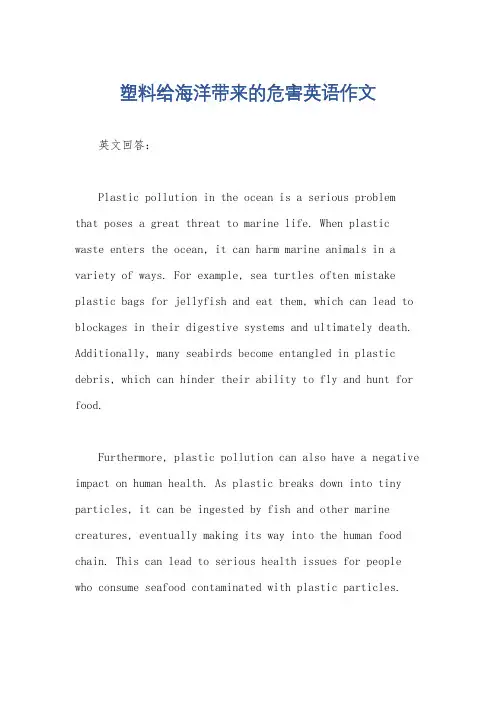
塑料给海洋带来的危害英语作文英文回答:Plastic pollution in the ocean is a serious problemthat poses a great threat to marine life. When plastic waste enters the ocean, it can harm marine animals in a variety of ways. For example, sea turtles often mistake plastic bags for jellyfish and eat them, which can lead to blockages in their digestive systems and ultimately death. Additionally, many seabirds become entangled in plastic debris, which can hinder their ability to fly and hunt for food.Furthermore, plastic pollution can also have a negative impact on human health. As plastic breaks down into tiny particles, it can be ingested by fish and other marine creatures, eventually making its way into the human food chain. This can lead to serious health issues for people who consume seafood contaminated with plastic particles.中文回答:塑料污染对海洋生物构成了严重威胁。
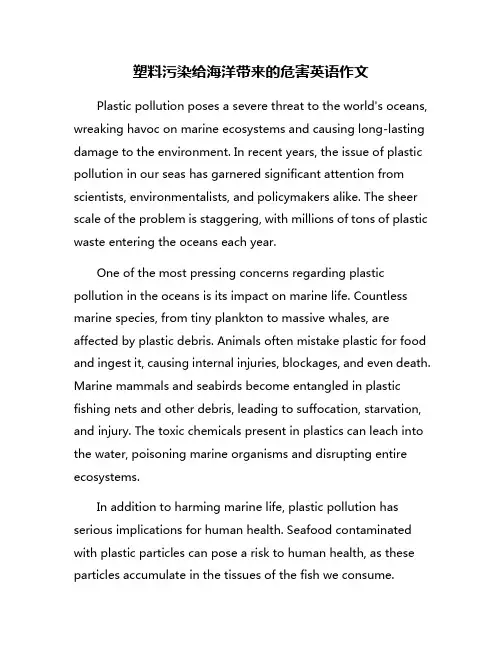
塑料污染给海洋带来的危害英语作文Plastic pollution poses a severe threat to the world's oceans, wreaking havoc on marine ecosystems and causing long-lasting damage to the environment. In recent years, the issue of plastic pollution in our seas has garnered significant attention from scientists, environmentalists, and policymakers alike. The sheer scale of the problem is staggering, with millions of tons of plastic waste entering the oceans each year.One of the most pressing concerns regarding plastic pollution in the oceans is its impact on marine life. Countless marine species, from tiny plankton to massive whales, are affected by plastic debris. Animals often mistake plastic for food and ingest it, causing internal injuries, blockages, and even death. Marine mammals and seabirds become entangled in plastic fishing nets and other debris, leading to suffocation, starvation, and injury. The toxic chemicals present in plastics can leach into the water, poisoning marine organisms and disrupting entire ecosystems.In addition to harming marine life, plastic pollution has serious implications for human health. Seafood contaminated with plastic particles can pose a risk to human health, as these particles accumulate in the tissues of the fish we consume.Moreover, microplastics – tiny plastic particles that result from the breakdown of larger plastic items – are present in many everyday products, such as cosmetics and cleaning agents. These microplastics can enter the food chain and eventually make their way into our bodies, with potential adverse health effects.The economic costs of plastic pollution in the oceans are also significant. Coastal communities that rely on fishing and tourism as sources of income are particularly vulnerable to the impacts of plastic pollution. Beaches strewn with plastic debris are unattractive to tourists, leading to decreased revenues for local businesses. Furthermore, the costs of cleaning up and mitigating the effects of plastic pollution on marine ecosystems are substantial, placing a burden on governments and taxpayers.Despite the seriousness of the problem, there is hope for the future. Efforts are underway around the world to reduce plastic pollution and protect our oceans. Many countries have implemented bans on single-use plastics, such as plastic bags and straws, in an effort to curb the flow of plastic waste into the seas. Innovative technologies are being developed to remove plastic debris from the oceans, while initiatives to promote recycling and waste reduction are gaining momentum.Individuals can also play a role in combating plastic pollution by reducing their use of single-use plastics, properly disposing of waste, and participating in beach clean-up efforts. By raising awareness about the issue and advocating for sustainable solutions, we can all contribute to a cleaner, healthier ocean environment for future generations.In conclusion, plastic pollution poses a serious threat to the world's oceans, with far-reaching implications for marine life, human health, and the economy. However, by taking action to reduce plastic waste, implement sustainable practices, and support conservation initiatives, we can help protect our oceans and ensure a brighter future for our planet.。
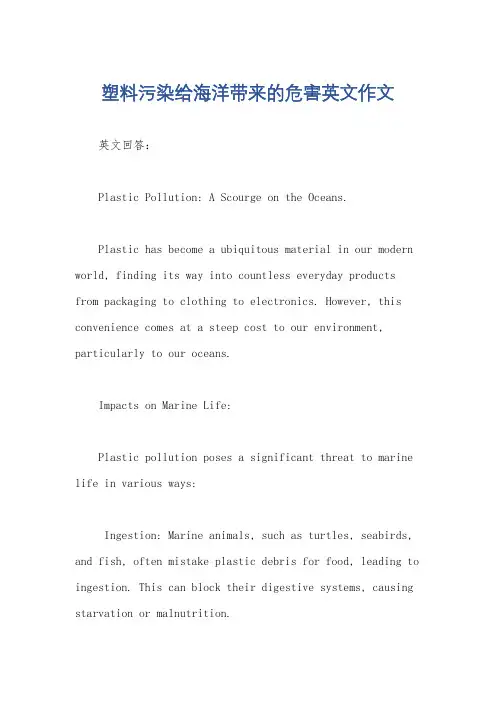
塑料污染给海洋带来的危害英文作文英文回答:Plastic Pollution: A Scourge on the Oceans.Plastic has become a ubiquitous material in our modern world, finding its way into countless everyday products from packaging to clothing to electronics. However, this convenience comes at a steep cost to our environment, particularly to our oceans.Impacts on Marine Life:Plastic pollution poses a significant threat to marine life in various ways:Ingestion: Marine animals, such as turtles, seabirds, and fish, often mistake plastic debris for food, leading to ingestion. This can block their digestive systems, causing starvation or malnutrition.Entanglement: Plastic items like fishing nets and packaging can entangle marine animals, restricting their movement, causing injury, and potentially leading to death.Toxic Effects: Plastic contains various chemicals that can leach into the marine environment. These chemicals can accumulate in marine organisms, causing developmental abnormalities, reproductive problems, and immune system dysfunction.Habitat Degradation: Plastic litter can smother coral reefs, seagrass beds, and other important marine habitats, impairing their ecological function and reducing biodiversity.Disruption of Marine Ecosystems:Plastic pollution also disrupts the delicate balance of marine ecosystems:Food Web Disruption: Plastic debris introduced intothe food chain can alter the availability and safety of food sources for marine organisms at all trophic levels.Nutrient Cycling: Plastics can adsorb nutrients from water, affecting the nutrient availability for primary producers like phytoplankton, which are the foundation of marine food webs.Ocean Acidification: Some types of plastic release carbon dioxide as they degrade, contributing to ocean acidification, which can harm marine organisms and coral reefs.Economic and Social Impacts:Plastic pollution also has economic and social consequences:Tourism and Recreation: Plastic litter degrades coastal environments, affecting tourism and recreational activities like swimming and fishing.Fishing Industry: Plastic entanglement can damage fishing gear and reduce fish populations, impacting livelihoods and food security.Coastal Infrastructure: Plastic litter can clog drains and waterways, causing flooding and sewage contamination.Addressing the Problem:Addressing plastic pollution in the oceans requires a multifaceted approach:Reducing Plastic Production and Consumption: Reducing the production and consumption of single-use plastics is crucial to minimizing the amount of plastic entering the marine environment.Improving Waste Management: Implementing effective waste management systems to prevent plastic from entering waterways is essential.Promoting Sustainable Practices: Encouraging the useof biodegradable or reusable alternatives to plastic products can help reduce overall plastic pollution.Raising Awareness: Raising public awareness about the impacts of plastic pollution and promoting responsible disposal practices is crucial for long-term solutions.Conclusion:Plastic pollution is a significant threat to the health of our oceans and the well-being of marine life. Urgent action is needed to reduce plastic production, improve waste management, and promote sustainable practices. By working together, we can mitigate the devastating impacts of plastic pollution and protect the future of our marine ecosystems.中文回答:塑料污染对海洋的危害。
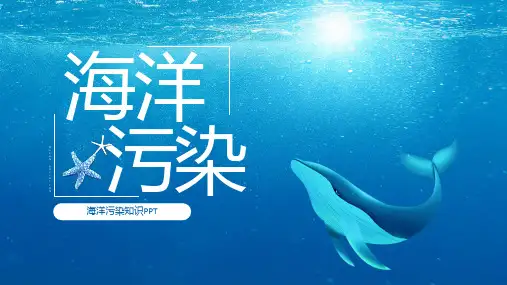
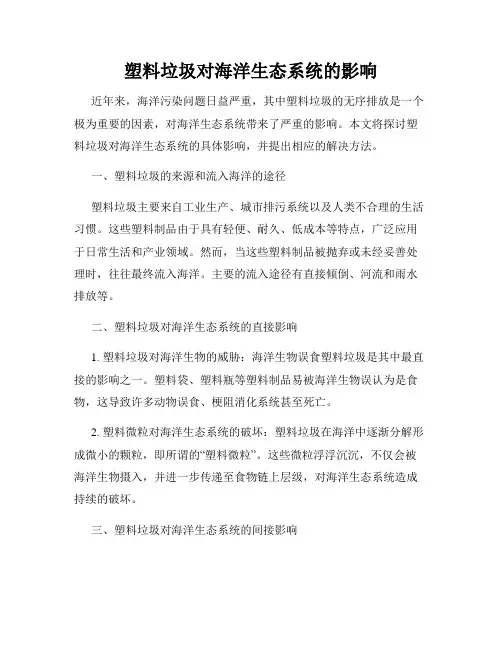
塑料垃圾对海洋生态系统的影响近年来,海洋污染问题日益严重,其中塑料垃圾的无序排放是一个极为重要的因素,对海洋生态系统带来了严重的影响。
本文将探讨塑料垃圾对海洋生态系统的具体影响,并提出相应的解决方法。
一、塑料垃圾的来源和流入海洋的途径塑料垃圾主要来自工业生产、城市排污系统以及人类不合理的生活习惯。
这些塑料制品由于具有轻便、耐久、低成本等特点,广泛应用于日常生活和产业领域。
然而,当这些塑料制品被抛弃或未经妥善处理时,往往最终流入海洋。
主要的流入途径有直接倾倒、河流和雨水排放等。
二、塑料垃圾对海洋生态系统的直接影响1. 塑料垃圾对海洋生物的威胁:海洋生物误食塑料垃圾是其中最直接的影响之一。
塑料袋、塑料瓶等塑料制品易被海洋生物误认为是食物,这导致许多动物误食、梗阻消化系统甚至死亡。
2. 塑料微粒对海洋生态系统的破坏:塑料垃圾在海洋中逐渐分解形成微小的颗粒,即所谓的“塑料微粒”。
这些微粒浮浮沉沉,不仅会被海洋生物摄入,并进一步传递至食物链上层级,对海洋生态系统造成持续的破坏。
三、塑料垃圾对海洋生态系统的间接影响1. 毒性物质传递:塑料制品中含有一系列化学物质,例如聚氯乙烯和邻苯二甲酸酯等,而这些化学物质容易溶解于水中。
一旦海洋生物误食含有毒性物质的塑料垃圾,这些化学物质将进一步通过食物链传递至更高层级的生物体内,对整个海洋生态系统造成潜在的危害。
2. 损害生态平衡:海洋中的塑料垃圾会影响光线穿透,减少水下植物的光合作用,进而对海洋生态平衡产生重大影响。
四、解决塑料垃圾问题的对策1. 加强环境教育:通过加强环境教育,提高公众对塑料垃圾问题的认识和环保意识,培养人们良好的垃圾分类与处理习惯。
2. 加强塑料垃圾管理与回收:政府应制定更加严格的法律法规,加强塑料垃圾的管理和回收工作,鼓励塑料制品的可持续生产和循环利用。
3. 创新塑料替代品:推动研发和应用可生物降解的替代品,减少对传统塑料制品的依赖。
4. 国际合作与共识:加强国际合作,建立塑料垃圾减排和管理全球共识,并通过国际组织和机制加强全球范围的塑料垃圾治理。
塑料污染给海洋带来的危害英语作文英文回答:Plastic Pollution and Its Detrimental Effects on Marine Ecosystems.Plastic pollution has emerged as a pervasive threat to the marine environment, posing significant risks to its biodiversity and ecological balance. This ubiquitous material accumulates in vast quantities within the ocean's ecosystems, leading to a myriad of detrimental consequences for marine life.1. Ingestion and Starvation:Marine organisms, from microscopic zooplankton to colossal whales, inadvertently ingest plastic particlesthat often resemble food sources. Ingestion of tiny plastic fragments can block digestive tracts, leading to starvation and even death. Moreover, plastics can leach toxicchemicals into the digestive system, causing internal damage and impairing nutrient absorption.2. Entanglement and Suffocation:Larger plastic debris, such as discarded fishing gear, entangles marine animals, restricting their movement and causing injuries. Entangled individuals may become unable to feed, reproduce, or avoid predators. Severe entanglements can lead to lacerations, infections, and ultimately death by suffocation or drowning.3. Habitat Degradation:Plastic pollution accumulates in marine habitats, transforming their physical and chemical properties. Discarded plastic bags, bottles, and other debris can smother coral reefs, seagrass beds, and other critical habitats. Plastic particles also adsorb and concentrate toxic compounds, creating hazardous environments for marine organisms.4. Reproductive Impairment:Exposure to plastic pollution can have profound effects on the reproductive health of marine species. Chemicals leached from plastics can disrupt hormonal balance, leading to reduced fertility and impaired reproductive success. In some cases, plastic particles can mimic natural hormones, causing abnormal development and reproductive dysfunction.5. Ecosystem-wide Impacts:The accumulation of plastic pollution in the marine environment disrupts ecosystem dynamics. Plastic particles can alter the food chain by reducing the availability of prey species or by introducing new contaminants into the system. Persistent plastic debris can also act as a physical barrier, hindering the movement of organisms and disrupting ecological processes.中文回答:塑料污染对海洋环境的危害。
垃圾对海洋生物的危害英语作文英文回答:The Detrimental Impacts of Litter on Marine Life.Marine litter poses a grave threat to the health and well-being of marine ecosystems and their inhabitants. Its insidious presence in our oceans has wreaked havoc on a vast array of marine species, causing severe injuries, fatalities, and population declines.Entanglement.Plastic and other debris can entangle marine animals, restricting their movement, causing injuries, and impairing their ability to feed and navigate. Entangled animals may become stranded or trapped, leading to starvation, exhaustion, or drowning. Sea turtles, whales, dolphins, and seabirds are particularly vulnerable to this hazard, as they often mistake plastic debris for prey.Ingestion.Marine animals can ingest plastic and other litter, mistaking them for food or prey. This can have devastating consequences, as ingested litter can block digestive tracts, cause malnutrition, and leach toxic chemicals into the animal's body. Ingestion of plastic can lead to weight loss, reduced reproductive success, and increased susceptibilityto disease. It has been estimated that over 1 millionmarine animals die each year due to plastic ingestion.Habitat Alteration.Litter accumulation can alter and degrade marine habitats, affecting the survival and reproduction of marine species. Plastic debris can smother coral reefs, block sunlight from reaching seagrass beds, and disrupt the feeding and breeding grounds of various organisms. Litter can also create искусственный рифы (artificial reefs), attracting certain species while deterring others, thereby disrupting the delicate balanceof marine ecosystems.Toxicological Effects.Plastic and other litter can leach toxic chemicals into the marine environment, posing a threat to marine organisms. These chemicals can accumulate in the food chain,ultimately reaching humans through the consumption of contaminated seafood. Exposure to toxic chemicals can cause a range of health problems in marine animals, including reproductive impairments, developmental disorders, and cancer.Mitigation Measures.Addressing the problem of marine litter requires a multifaceted approach involving efforts from governments, industries, and individuals. Key mitigation measures include:Reducing plastic consumption and promoting sustainable alternatives.Improving waste management practices to prevent litter from entering waterways.Implementing beach cleanups and awareness campaigns.Supporting research and innovation to develop biodegradable materials and litter removal technologies.Conclusion.The detrimental impacts of marine litter on marine life are undeniable. Entanglement, ingestion, habitat alteration, and toxicological effects pose serious threats to thehealth and well-being of marine ecosystems and their inhabitants. Mitigation efforts are essential to combatthis pervasive problem and safeguard the future of our oceans and marine species.中文回答:海洋垃圾对海洋生物的危害。
塑料污染对海洋生态的危害近年来,随着人类对塑料制品的广泛使用,塑料污染问题日益严重。
尤其是海洋生态系统成为了塑料污染的重灾区。
塑料污染对海洋生态的危害不容忽视,给海洋生物、生态平衡以及人类社会带来了巨大的威胁。
首先,塑料污染对海洋生物造成了直接的伤害。
大量的塑料垃圾进入海洋后,被海洋生物误食。
海洋生物无法分辨塑料与食物的区别,它们将塑料当做食物摄入,导致消化道堵塞、窒息甚至死亡。
此外,一些塑料制品中含有有毒物质,如邻苯二甲酸盐(Phthalates)和双酚A(BPA),这些物质会渗入海洋生物体内,对其生殖能力和生长发育产生负面影响。
其次,塑料污染破坏了海洋生态平衡。
海洋是一个复杂而精密的生态系统,各种生物之间存在着微妙的相互关系。
而塑料污染破坏了这种平衡。
例如,海洋中的浮游生物是海洋食物链的基础,它们被塑料污染所威胁。
一旦浮游生物数量减少,将直接影响到食物链上层的海洋生物,甚至会导致整个生态系统的崩溃。
此外,一些大型海洋生物如鲸鱼和海龟,常常被塑料袋或渔网缠绕,导致窒息或无法正常捕食。
再次,塑料污染对人类社会也带来了巨大的威胁。
海洋是地球上最大的储存碳的库所之一,而塑料污染加剧了海洋酸化。
海洋酸化不仅破坏了海洋生态系统,还对人类的经济活动造成了负面影响。
例如,海洋酸化会导致珊瑚礁的白化和死亡,从而影响到旅游业和渔业的发展。
此外,塑料污染还会对海洋沿岸地区的居民健康造成威胁。
塑料垃圾中的有毒物质会通过食物链进入人类体内,导致慢性疾病的增加。
为了解决塑料污染对海洋生态的危害,全球各国都在采取积极的措施。
一方面,加强塑料垃圾的回收和处理工作,减少塑料进入海洋的数量。
另一方面,推动塑料制品的替代和创新,减少对塑料的依赖。
例如,一些国家已经禁止或限制使用一次性塑料制品,鼓励使用环保材料代替塑料。
此外,加强公众教育,提高人们的环保意识,让每个人都参与到塑料污染治理中来。
总之,塑料污染对海洋生态造成了严重的危害。
海洋生态系统中微塑料对生物多样性的影响随着全球塑料生产和使用的爆炸性增长,塑料污染已成为当今世界面临的严重问题之一。
很大一部分塑料垃圾最终流入海洋,形成了海洋塑料污染。
除了大型塑料碎片外,近年来科学家们逐渐关注到了海洋中的微塑料,这是指颗粒大小小于5mm的塑料碎片。
微塑料的存在对海洋生态系统和生物多样性产生了巨大影响。
首先,微塑料对海洋生态系统中的物种多样性造成了直接影响。
微塑料的高度稳定性使其能够在海洋环境中长期存在。
海洋生物如鱼类、海洋无脊椎动物等误将微塑料当作食物摄入体内。
这不仅导致了海洋生物的误食问题,还可能引发连锁反应,影响整个食物链中的物种。
研究表明,大量的微塑料摄入可能导致鱼类肝脏和鳃的损伤、内分泌系统紊乱,甚至促进肿瘤的发生。
此外,微塑料对藻类的光合作用也产生了负面影响,从而干扰了海洋生态系统中的能量流动。
其次,微塑料可能导致海洋生态系统中物种数量的减少。
微塑料不仅影响食物链上游的生物,也会影响整个海洋生态系统中的底层物种。
许多微生物是海洋生态系统中重要的生物组成部分,它们参与了生态系统的氮、碳循环等基本生态过程。
微塑料的存在可能对这些微生物群落产生毒性影响,并导致其中一些关键物种的灭绝。
这将直接影响到整个海洋食物网的稳定性和功能。
此外,微塑料的存在还可能改变海洋生态系统的生境结构,从而影响生物多样性。
微塑料可以在海洋表面形成浮游聚集体,提供了一种新的庇护所和补给源,吸引着一些浮游生物如浮游动物和浮游植物。
而造成聚集的微塑料可能导致这些生物过度集聚,增加竞争和捕食压力,从而改变原有的生态环境。
此外,微塑料可能还会在海底沙层中堆积,破坏底栖生物的栖息地和繁殖场所。
为了解决这一问题,应采取一系列措施来减少微塑料对海洋生态系统的影响。
首先,减少塑料的使用量和生产量至关重要。
政府和企业应该推动环保型产品的研发和生产,并提倡可再生可降解材料的使用。
同时,加强塑料垃圾的回收和处理,削减塑料进入海洋的途径。
海洋生物与海洋污染塑料垃圾对海洋生物的影响海洋是地球上最广阔的生态系统之一,其中栖息着各种海洋生物。
然而,近年来,海洋污染问题越来越引起人们的关注。
特别是塑料垃圾的大量排放和不当处理,对海洋生物造成了严重的影响。
本文将探讨海洋生物与海洋污染塑料垃圾之间的关系,以及这种影响对生态系统和人类的潜在危害。
一、塑料垃圾对海洋生物的物理威胁塑料垃圾在海洋中的增加对海洋生物造成了直接的物理威胁。
大量的塑料垃圾漂浮在海水中,形成了所谓的“塑料大陆”。
海洋生物可能会被这些塑料垃圾缠绕或误食。
由于塑料的耐久性,这些垃圾在海洋中存在时间长,导致海洋生物长时间暴露在威胁中。
1. 缠绕威胁塑料垃圾往往会缠绕在海洋生物的身体上,如海龟的颈部或鳍状肢。
这些缠绕物会限制它们的活动能力,影响生物的正常生长和繁殖。
一些海洋哺乳动物也会因为缠绕的塑料垃圾导致窒息或溺水。
2. 误食威胁塑料垃圾的大小和形状很容易被海洋生物误认为是食物。
很多海洋物种,包括鱼类、鸟类和海洋哺乳动物,常常以塑料垃圾为食。
这对于海洋生物造成了严重的健康问题,比如胃肠堵塞、内脏损伤和营养摄取不足。
此外,一些塑料中的化学物质可能会渗入食物链,进一步危害整个生态系统。
二、塑料垃圾对海洋生物的生态影响除了物理威胁外,塑料垃圾还对海洋生物的生态环境产生了广泛的影响。
1. 栖息地破坏塑料垃圾大量积聚在海洋中,对海洋生物的栖息地造成了破坏。
它们往往会附着在珊瑚礁、海草床和海洋底部,阻碍光线和氧气的进入,破坏这些栖息地的生态平衡。
许多海洋生物失去了它们的栖息地,无法正常生活和繁衍。
2. 物种多样性丧失海洋生物对于海洋生态系统的稳定起着重要的作用。
然而,塑料垃圾的存在使得一些物种的生存环境恶化,导致物种数量减少和物种多样性丧失。
这进一步破坏了海洋生态系统的平衡,可能引发连锁反应,对其他生物和整个海洋生态系统产生不可逆转的影响。
三、海洋污染塑料垃圾对人类的潜在威胁塑料垃圾对海洋生物的影响不仅仅局限于海洋生态系统,它还对人类自身构成了潜在的威胁。